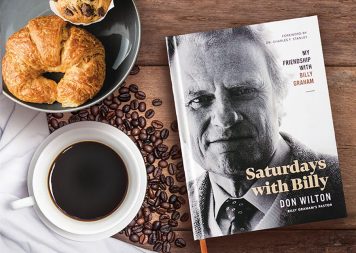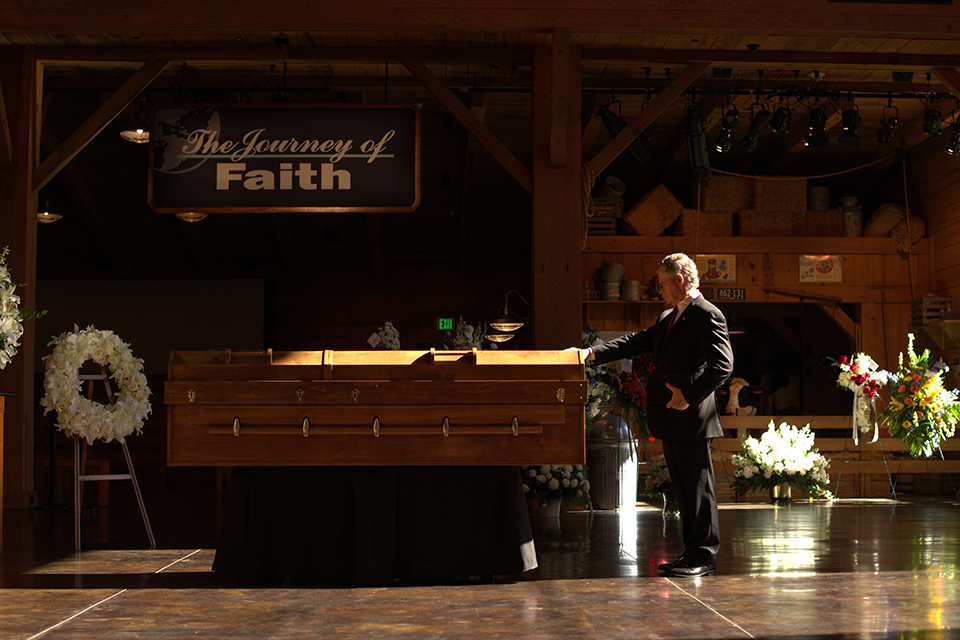
On Sundays, you can find Dr. Don Wilton behind the pulpit at First Baptist Church in Spartanburg, South Carolina. But for years, the pastor didn’t share his Saturday whereabouts with anyone except his wife.
It was an unspoken trust he closely guarded.
In his new book, Saturdays With Billy: My Friendship With Billy Graham, Wilton writes about weekly visits to see Billy Graham at his home in Montreat, North Carolina. The book was released on April 13.
>>Order Saturdays With Billy: My Friendship With Billy Graham.
>>Pastor Don Wilton will sign his new book at the Billy Graham Library on May 6.
The honor of what he calls this “uncommon friendship” didn’t elude Wilton. In 20-plus years, “For every question he asked me, I asked him a hundred,” Wilton said. “He taught me and he poured out his heart in doing so.”
What’s the most important thing Wilton learned? Without hesitation he replied, “Love God. Love others. Just love Jesus with all your heart, all your soul, all your mind.”
About 10 years in, Graham formally asked if he could be a member of Wilton’s church. While traveling the world, Graham had longed to be a part of a local church, Wilton discovered.
During an interview from his home office, the South African pastor delighted in recalling the stories, jokes and laughs they shared. Surrounded by family photos, Bibles and a large photo of himself and Billy Graham, Wilton went through some of the stories found in Saturdays With Billy.

Only a dip in the 20-year bucket of memories.
What stands out to him is their conversations. Simply, the weekly and daily “ta-te-ta”—or endearing banter—between two friends. Time spent eating BBQ and hot dogs, and playing with the Grahams’ dogs.
A Servant Like Jesus
It all began on a Sunday in 1993. Billy and Ruth Graham had seen Wilton preach on TV and called to invite him to their home. The next Saturday, Wilton made the one hour and 20-minute drive up the mountain. On a beautiful summer day, they sat in the front yard drinking tea, talking, laughing. Pastor to pastor.
“He always made me feel like I was the important person. … That I had the answer, that I had the ear of God, that I was the one who understood what the Bible was saying. … It was all backwards,” Wilton chuckled.
“And the only way I came to understand this was that I was watching someone who reflected the Lord Jesus Christ. Jesus humbled Himself to the point that He became the servant.”
Ultimately, Billy Graham’s entire life was a picture of true Biblical servanthood, Wilton said. And not just because he stood in the pulpit in front of a million people. Not simply because he was close friends with presidents and prime ministers. Not just because he was so highly regarded.
“I saw that [servanthood] in the finer nuances of intimate conversation,” explained Wilton. “I saw this in the sweat of his brow. I saw this in the core of his heart. I heard this in the conversation of his prayer. I felt this in the touch of his hands.”
Wilton spent thousands of hours with “Brother Billy,” as he called him in private. Always “Mr. Graham” in public. Noting the evangelist’s humility, Wilton referred to Galatians 6:14, which was posted in a number of places around Graham’s home:
But far be it from me to boast except in the cross of our Lord Jesus Christ, by which he world has been crucified to me, and I to the world.
In the chapter titled “Billy’s Eyes,” Wilton recalled their many conversations about Billy Graham Evangelistic Association (BGEA) Crusades. Over 70 years’ time, Billy Graham preached the Gospel of Jesus Christ to some 215 million people at more than 400 Crusades, simulcasts and evangelistic rallies in more than 185 countries and territories.
Every Saturday those piercing eyes told a thousand stories as they gazed out across the brilliance of the mountains. His gaze shifted from the front lawn of the house, across the distant hills, and all the way up to the “uttermost part of the earth” (Acts 1:8 KJV). As he sat and stared, it was as though he were back among those tribes and cultures. He could hear their languages. … The people were his life’s mission. His eyes were firmly fixed on them. “The whole world needs Jesus,” he would say over and again.
Wilton said the millions of people never left Graham’s heart. “It was about the people for whom Christ died and his ongoing prayer of intercession.
“And I came to understand why so many people would respond [to the Gospel] and come to hear him. Because every person, it would seem, in every stadium, no matter how many thousands of people there were, all felt like he was talking to them personally.”
Wilton recalled Billy Graham’s profound impact on the apartheid movement. As a teen in South Africa, he remembers news reports stating Graham’s refusal to hold a segregated Crusade. “Jesus died for all people,” Graham preached. Wilton remembers his strong conviction that “The Lord Jesus did not have color in His eyes.”
The Last Visit
Wilton last saw Billy Graham on February 16, 2018, five days before his homegoing. It was a Friday. Wilton was preparing to teach that weekend and planned to see Graham again that next Tuesday, the day before his friend was called to Heaven.
The pastor sat next to his 99-year-old dear friend in the study that Friday and did most of the talking. When it was time to go, Wilton remembers Billy Graham “leaned his head over and lay his head on my right shoulder. And he just kept it there. He never said anything.”
Before leaving, they prayed, like always. “He placed his right hand over my hand and we sat like that for the longest of time. I prayed for him and thanked the Lord Jesus for him. It was a very deep spiritual moment.
“And I walked out of the room. And that was the last time I saw him alive.
“Down to the very last, the Spirit of Christ welled up within him,” confirmed Wilton. “A fire burned within him. That blaze was never put out.”
Fifteen years earlier Billy Graham had told him, “I want you to hold my hand as I go to heaven.
“We held hands a lot. We always did. That symbolical last time was something very special.
“I loved him so much. … Every week I just miss him. It’s like this gaping hole,” Wilton shared.
“I frequently turn to my wife and say, ‘I should be getting in my motorcar right now, headed up to Montreat, you know.’”
You can have a personal relationship with Jesus Christ like Billy Graham and Don Wilton. Pray now and ask Christ into your heart.
>>See all upcoming Library events.

Give To Internet Evangelism
